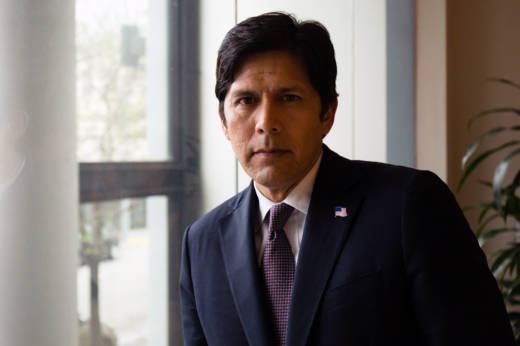"Being a legislative leader doesn’t give you a lot of pop with voters," South says. "On the downside, you fall heir to all the scandals and problems of Sacramento."
As a legislator, de León has a history of support for legislation aimed at protecting women from harassment. In 2015, for example, de León and Santa Barbara Sen. Hannah-Beth Jackson co-authored a bill, SB 967, aimed at stemming the alarming incidence of sexual harassment and assault on college campuses.
Known as the "yes means yes" bill, it ties state funding for public colleges and universities to their creating policies of "affirmative consent" for sexual activity, along with student education and better access to counseling for victims of assault.
On the other hand, for the past four years, an Assembly bill to give whistleblower protections to legislative staff quietly died in the Senate. That will likely change in the coming session.
De León’s campaign declined to making anyone available for an interview. But in a recorded response to questions, campaign consultant Courtni Pugh criticized the U.S. Senate -- and by implication, Dianne Feinstein -- for only recently taking steps to address long-standing sexual harassment.
"Just last week, after 1,500 congressional aides signed a letter, the U.S. Senate finally passed a resolution to mandate sexual harassment training," Pugh says. "It’s just decades too late, and this is the same Washington, D.C., full of institutional defenders of the status quo."
Despite what many would call a solid record of supporting women's issues, de León may find himself constrained from attacking Feinstein or describing himself as the better advocate for women.
Feinstein is a political icon to many women, says Democratic strategist Mary Hughes, noting that Donald Trump's election has unleashed a "fierceness" among women voters that could help inoculate her from political attacks.
But Hughes says the harassment issue is also an opportunity for de León, who is still not well known outside his Los Angeles district. "How do you comport yourself in a moment like this? If you’re the leader in the storm, what are you showing us? Are you fair, transparent and calm?"
"The upside could be great if you manage it in an aspirational way," Hughes adds. "What’s the best that can come of it. Can I lead that?'"
UC San Diego political science professor Thad Kousser agrees. On the one hand, Kousser says, the timing couldn't be worse for de León. "On the other hand," he says, "it gives him a strong podium to take a strong stand against [harassment] and to talk about what he’s doing to stop it in the California State Senate."
Complicating his task is the fact that until recently de León shared a Sacramento apartment with Sen. Tony Mendoza, who has been accused of inappropriate sexual behavior by a former intern. De León moved out of the apartment last weekend, but the situation surely puts him closer to the investigation than he'd like.
Not surprisingly, political operatives working on Feinstein's behalf like this turn of events. "It takes Feinstein from a position of defense to a position of offense overnight," says Sean Clegg, whose firm SCN Strategies is coordinating an independent expenditure campaign to help Feinstein.
"[It's] not about Kevin De León or anyone else," Clegg insists. "It’s about the temperature gauge in our society right now among women being very, very high. And it represents an opportunity."
Feinstein's longtime consultant, Bill Carrick, declined to talk about how the current dynamics affect the race against de León, but he sees a parallel between today's political climate and 1992, the so-called Year of the Woman that helped Feinstein and Barbara Boxer win their first terms in the U.S. Senate.
Carrick, pointing to the recent election in Virginia, says "women are just very anti-Trump and they’re expressing that by voting in dramatic numbers."
After the letter describing a "pervasive" culture of sexual harassment, de León announced he was hiring two independent law firms to investigate the allegations. But that didn't satisfy some of the women who organized the letter, who criticized the move as lacking transparency.
Adama Iwu, who helped spearhead the letter, told the Los Angeles Times that "to find the truth and rebuild trust, we need a truly independent investigation, not a secretly hand-picked self-investigation."
Sunday night, the Senate Rules Committee and de León announced that the Senate would no longer handle complaints of sexual abuse, assault or harassment internally. Instead, they would be turned over to an "outside legal team."
In a statement, de León said that "this State Senate is a sacred place of public service and it must also be a safe place for everyone who works here. The people who work here and the public we serve must have complete confidence that no public official is above the law or our strict zero-tolerance harassment policies. Those who violate these policies will be held to account - swiftly and justly."
Meanwhile, over in the Assembly, the first in a series of public hearings is scheduled Nov. 28 at the state Capitol.
